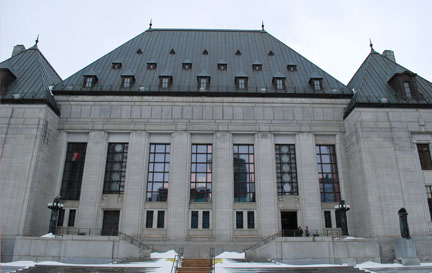In the first week of the winter 2015 session, the Supreme Court of Canada will hear five appeals, including a number of criminal cases dealing with extradition, murder and sexual coercion. The court will also hear a set of appeals involving the power of government to withhold privileges like driving to those who avoid fines by declaring bankruptcy.
 Jan. 14 – Ontario – R. v. Rodgerson
Jan. 14 – Ontario – R. v. Rodgerson
Criminal law: Jason Rodgerson was convicted of murdering a woman he met at a bar. At trial, the judge admitted into evidence Rodgerson’s flight from police and the lies he initially told them. On appeal, Rodgerson argued that the post-offence conduct was improperly admitted into evidence and that forensic evidence bolstered his case for self-defence. The majority accepted his appeal and ordered a new trial. The SCC will review whether the majority at the Ontario Court of Appeal erred in failing to apply the curative proviso.
Read the Ontario Court of Appeal’s decision
Related news stories:
Woman, 21, found dead in Oshawa grow-op, Toronto Star
Life sentence for man who killed, buried Oshawa mom, durhamregion.com
Jan. 15 – Alberta and Ontario – Alberta v. Moloney and 407 ETR Concession v. Canada
Constitutional law: Moloney was an uninsured driver who was at fault in a car accident. He was unable to pay a judgment against him and declared bankruptcy. He was discharged from his debts, but the Alberta government suspended Moloney’s licence and privileges. In the second case, a registrar in bankruptcy directed Ontario’s Ministry of Transportation to issue licence plates to a driver who had declared bankruptcy as a result of toll charges on Hwy. 407. The SCC will review whether governments are entitled to withhold privileges from drivers who’ve been discharged from their debts.
Read the Alberta Court of Appeal’s decision
Read the Ontario Court of Appeal’s decision
Related news stories:
Denying licences conflicts with ‘fresh start principle,’ Law Times
Hwy. 407 debts no reason to deny vehicle permits to bankruptcy driverse, court rules, Toronto Star
Jan. 16 – Alberta – Rollison v. R. and Barabash v. R.
Criminal law: Shane Gordon Rollison and Donald Barabash were both acquitted of making child pornography involving two 14-year-old girls. The trial judge, applying the SCC’s 2001 ruling in R. v. Sharpe, acquitted them on the basis the video was for private use only and the age of consent at the time was 14. On appeal, the court took into account the possible vulnerability of the two girls — who were described as sexually active, drug-using runaways — and ruled the judgment in Sharpe did not contemplate such a scenario, overturning the acquittal. A publication ban is in place.
Read the Alberta Court of Appeal’s decision
Related news story:
Edmonton child pornographers see acquittal overturned on appeal, Edmonton Sun
 Jan. 14 – Ontario – R. v. Rodgerson
Jan. 14 – Ontario – R. v. RodgersonCriminal law: Jason Rodgerson was convicted of murdering a woman he met at a bar. At trial, the judge admitted into evidence Rodgerson’s flight from police and the lies he initially told them. On appeal, Rodgerson argued that the post-offence conduct was improperly admitted into evidence and that forensic evidence bolstered his case for self-defence. The majority accepted his appeal and ordered a new trial. The SCC will review whether the majority at the Ontario Court of Appeal erred in failing to apply the curative proviso.
Read the Ontario Court of Appeal’s decision
Related news stories:
Woman, 21, found dead in Oshawa grow-op, Toronto Star
Life sentence for man who killed, buried Oshawa mom, durhamregion.com
Jan. 15 – Alberta and Ontario – Alberta v. Moloney and 407 ETR Concession v. Canada
Constitutional law: Moloney was an uninsured driver who was at fault in a car accident. He was unable to pay a judgment against him and declared bankruptcy. He was discharged from his debts, but the Alberta government suspended Moloney’s licence and privileges. In the second case, a registrar in bankruptcy directed Ontario’s Ministry of Transportation to issue licence plates to a driver who had declared bankruptcy as a result of toll charges on Hwy. 407. The SCC will review whether governments are entitled to withhold privileges from drivers who’ve been discharged from their debts.
Read the Alberta Court of Appeal’s decision
Read the Ontario Court of Appeal’s decision
Related news stories:
Denying licences conflicts with ‘fresh start principle,’ Law Times
Hwy. 407 debts no reason to deny vehicle permits to bankruptcy driverse, court rules, Toronto Star
Jan. 16 – Alberta – Rollison v. R. and Barabash v. R.
Criminal law: Shane Gordon Rollison and Donald Barabash were both acquitted of making child pornography involving two 14-year-old girls. The trial judge, applying the SCC’s 2001 ruling in R. v. Sharpe, acquitted them on the basis the video was for private use only and the age of consent at the time was 14. On appeal, the court took into account the possible vulnerability of the two girls — who were described as sexually active, drug-using runaways — and ruled the judgment in Sharpe did not contemplate such a scenario, overturning the acquittal. A publication ban is in place.
Read the Alberta Court of Appeal’s decision
Related news story:
Edmonton child pornographers see acquittal overturned on appeal, Edmonton Sun







